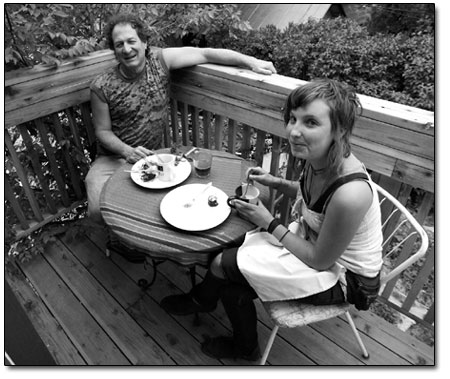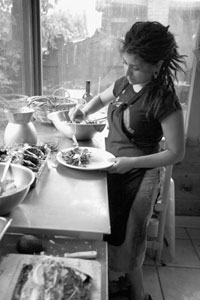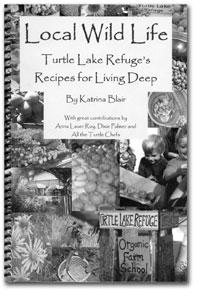|
| ||||||
| Local, wild and raw SideStory: A visit to the Wild Life Café
by Rachel Turiel Perhaps you have tasted a completely raw, wild and local serviceberry ice cream cone at the Durango Farmer’s Market on a balmy summer morning. Maybe your child has munched granola at a low, wooden table in a 9-R cafeteria. Chances are, you, your child, or your dog has frolicked in the grass at Brookside Park, Durango’s first chemical-free park. If so, you’ve been touched by Turtle Lake Refuge, the Durango nonprofit founded and run by Katrina Blair. Blair, born and raised in Durango, has released her first book, Local Wild Life, Turtle Lake Refuge’s Recipes for Living Deep. This book contains 193 recipes, grouped in conventional categories such as drinks, soups, salads, main dishes and desserts. And at first glance many of the recipes appear as conventional as a Midwest pantry. There are pizzas, chili and apple pie. There is lasagna, fudge and ice cream. Look closer however, and you will see the book’s philosophy (and its recipes) nailed perfectly in the name of Blair’s Durango restaurant: Local Wild Life Cafe. These recipes call for ingredients that are entirely raw, mostly local and containing some ingredient from the wild, which puts a new twist on zucchini herb cheese tortellini (pg. 127). Why , and what does this mean? Blair explains in her book that less travel time for food means greater nourishment with fewer resources required. Wild foods connect us to the land we inhabit and provide one of the highest mineral sources available. And living foods are foods that have not been cooked, preserving the naturally occurring enzymes needed for digestion, metabolism and energy. Blair has a soft spot for those plants we call weeds, the very plants we’ve been trained to rip from our yard with everything from hands to tools to poison. The chapter “Wild Weeds Are Our Greatest Resource” reads like a love sonnet in which Blair counts the ways she loves the dandelion, plantain, purslane and mallow. Wild weeds provide protein, abundant vitamins, and a rainbow of minerals and enzymes while requiring no tending or resources. Weeds are abundant, virtually impossible to over-harvest, readily accessible, and free. If you gaze upon your back yard and see a tangle of weeds, Blair sees a salad bar, or a source for her
If Blair appears a bit out there in her dining practices, touting thistles as “nature’s doctor at your doorstep,” or reminding us that overly processed and preserved foods can slow down our “vibrational spin,” much of the Durango community is wholeheartedly on board. The café, open since 1998, serves lunch to 30 to 40 people each of the two days it’s open. Edible “turtle creations” can be found at six stores in Durango, and more than 1,000 people have attended Blair’s chi food class (a four-week raw food preparation class), learning to spin raw veggies, fruit, nuts and sprouts into gourmet meals. Each year, more than 150 people volunteer their time and skills towards the many projects TLR undertakes. And Blair is blessed with three to five Fort Lewis College interns each semester. This people-powered organization is like a buzzing beehive; there is always work to be done and the fruits of the labor are as sweet as honey, or perhaps raw Almond Joys (pg. 163). Though Blair rhapsodizes on the glory of sun-sweetened barberries and apple sugar (after pressing apples for cider, TLR dries the pulp for sweetener), she doesn’t skimp on science. Blair has done extensive research on raw foods and wild plants and discusses the biochemical properties of various plants and how they impact our bodies. In the section “Permaculture Plants,” Blair discusses her fascinating theory exonerating weeds and recasting them as pioneers that restore balance, fertility and health to disturbed ground. The book is sprinkled with gorgeous color photos, at least one per page. The pictures of food are artfully arranged with an appealing truthfulness not seen in the glossed and primped food photos of many cookbooks. The basket of local peaches contains a few pockmarked fruit, perhaps from a summer hail storm, and not every chokecherry in a cluster is burgundy-ripe, because that’s exactly how they appear when harvested. The photos also contain more than 100 Durango locals, cranking apple presses, clinking glasses filled with crimson prickly pear-fruit juice, or feasting on raw Rasta Pasta swirled in dandelion pesto at the Local Wild Life Café. The book is spiced with stories, like the one titled “The Pie Eating Contest: Serviceberry vs. Peach Cobbler,” featuring photos of some local elected officials gorging on pie without the use of hands. However, the principle story may be that of Katrina’s mother, Pat Blair, who was virtually saved from her debilitating arthritis by incorporating juice fasts and raw food to her diet. A healthy dose of poetry is intermixed with recipes, local of course, with wild styles and raw twists of phrase. At a time when the economy is uncertain, the lightning pace of technology can be overwhelming, and our disconnection from the Earth is growing, Blair shares a simple message. Eat like the animals do, she urges: raw, wild and local. Live well, eat in season, and remember, food tastes best when prepared with love and shared with friends. •
|




